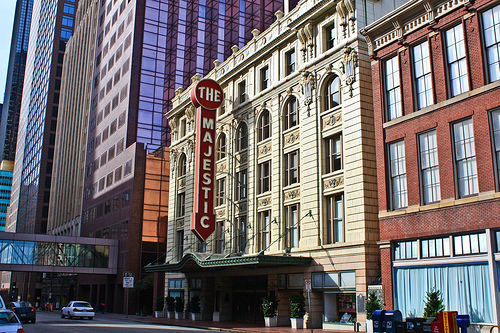
9 Recommendations for the Dallas International Film Festival
The Dallas International Film Festival presented by Boardwalk Auto Group Volkswagen Dealers will run April 12 – 22. DIFF celebrates its 6th year with 111 films representing 27 countries, 5 World Premieres, 1 North American Premiere, 1 U.S Premiere and 36 Texas Premieres. To purchase tickets and passes, telephone the Prekindle Box Office at 972-707-0838 or visit: www.DallasFilm.org.
5 BROKEN CAMERAS (Directors: Emad Burnat, Guy Davidi)
Winner of the World Cinema Directing Award: Documentary at Sundance 2012, 5 Broken Cameras gives us an up-close and personal look at what life near the Palestinian-Israeli boarder is really like. We observe as the people of Bil’in risk their lives, again and again and again, in feeble attempts to reclaim their land. 5 Broken Cameras serves as an extremely powerful weapon against the atrocities that Israel commits on a daily basis in Palestine. We can only hope that Emad Burnat’s five cameras will be mightier than all of the weaponry of the Israeli army.
AMERICA’S PARKING LOT (Director: Jonny Mars)
Austin-based actor, Jonny Mars makes his directorial debut with America’s Parking Lot (which premiered at SXSW 2012), a multi-faceted documentary about the renowned Dallas Cowboys’ Gate 6 tailgaters. Mars’ astute understanding of the documentary form – especially in terms of narrative arc and development of conflict – is astounding. If I didn’t know any better, I would have assumed America’s Parking Lot was directed by a seasoned veteran.
EXTRATERRESTRIAL (Director: Nacho Vigalondo)
With Extraterrestrial, Nacho Vigalondo utilizes what could very well be a lost Twilight Zone episode to cleverly examine human relationships and the extreme lengths that men will go to in order to “win” a woman. Extraterrestrial also functions as a well-crafted metaphor for the way that the fear of the “other” is often used to manipulate people’s emotional responses to situations
GAYBY (Director: Jonathan Lisecki)
Jonathan Lisecki’s Gayby intelligently discusses sexuality (including issues of gay identity), aging, friendship, loneliness, and the definition of family. Gayby is not a “gay film”; it is a film about people and relationships, whether they be L-G-B-T-Q or A…and everything in between. Gayby is a well-written (and acted) and undeniably silly romantic comedy that just so happens to include a lot of gay-oriented humor. Lisecki’s goal is not to segregate his audience; instead he hopes to create a better understanding of sexuality and gender.
GIRL MODEL (Directors: David Redmon, Ashely Sabin)
Shot in an uncompromising cinéma vérité style, Girl Model does not rely upon any of the falsifying flourishes that so many modern documentaries utilize. With no on-camera presence, voiceover narration, graphics or reenactments to increase the “entertainment value,” Redmon and Sabin’s directorial influence barely registers on our radar. That said — we are always aware that we are experiencing Girl Model from the perspective of Redmon and Sabin’s kino eyes. Redmon and Sabin spent countless months documenting their subjects with keen observational insight and they sculpted Girl Model from that footage.
KID-THING (Director: David Zellner)
Shot from the perspective of a young girl named Annie (Sydney Aguirre), Kid-Thing seamlessly blends fairy tale-like surrealism with gritty realism. Annie’s mother is long gone and her father (Nathan Zellner) is unfit to be raising goats let alone a prepubescent girl. More often than not, Annie’s father appears to be drunk, so she must rely upon shoplifting for nourishment. It is this incredibly banal existence that prompts Annie to go out and experience the world around her. Annie is like an untamed animal that has never been properly socialized with others. She runs wild with reckless abandon; smashing stuff with an aluminum baseball bat, shooting paint pellets at dead animals and throwing large balls of dough at moving cars.
SALT OF LIFE (Director: Gianni Di Gregorio)
Like Gianni Di Gregorio’s Mid-August Lunch, The Salt of Life is set in the writer/director/star’s native Trastevere, a working-class district in Rome; and once again Di Gregorio plays Gianni, a dutiful middle-aged son to an aged mother, Valeria (Valeria De Franciscis Bendoni).The Salt of Life features guerrilla-style lensing, utilizing only natural light, as Di Gregorio single-handedly resurrects the Italian cinematic tradition of Neo-Realism of De Sica, Fellini, Rossellini and Visconti.
TCHOUPITOULAS (Directors: Bill Ross, Turner Ross)
Tchoupitoulas does a tremendous job of defying classification. It functions as both a surreal documentary that borrows from narrative storytelling techniques and a narrative film that paints a realistic portrait of its protagonists by utilizing documentary devices. The narrative unfolds like an improvised jazz album with various tangents that flow seamlessly away from and towards the forward-moving primary thread. The tempo continuously alternates as well; as the sublime, impressionistic cinematography alternates between running, walking and pausing. We are fully immersed into the surrounding environment from the perspective of three young brothers as they embark upon an adventure deep into the heart of New Orleans.
WOLF (Director: Ya’Ke Smith)
Wolf works incredibly well because Smith grounds the film firmly in reality, fully fleshing out his characters and never over-dramatizing their actions. (Smith certainly could not have done this without Jordan Cooper, Shelton Jolivette, Mikala Gibson, Irma P. Hall and Eugene Lee’s awe-inspiring performances.) The unbridled realism is what gives Wolf its gut-wrenching power. Wolf is an emotionally challenging film that is sure to prompt deep philosophical discussions about power, corruption, religion and society. Is that not the purpose of art? To challenge us. To make us think. To make us react.
